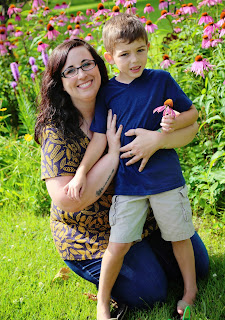AUTISM AND SPEECH DIFFICULTIES
People with Autism have a hard time communicating verbally or non-verbally. Some ASD individuals have a full vocabulary and have gone on to do great things, and some individuals are non-verbal adults who have to be monitored constantly due to self-harm. Autism is a HUGE spectrum. With that being said, I'm going to touch on one of the hardest things I've had to deal with in our journey.
Jaxon was 2 years old when his Pediatrician wanted him to get his hearing checked and his speech evaluated. My mom and I thought that Jaxon was just a late talker. No big deal. Once he was diagnosed and we continued in speech therapy, I realized that teaching my son how to talk and pronounce sounds correctly was a going to be a battle. Looking back on videos for this post, I forgot that Jaxon was around 5 before he really started talking in words we could understand, even then a lot of it wasn't pronounced correctly. Before that it was just grunts and noises. It was like having a 2 year old talking, but my kid was 5 years old.
Now Jaxon is 6 and is really talking up a storm. He doesn't say many sentences, but he can get his needs across (especially if he wants a snack). Technically being "non-verbal" to me means that you cannot carry on a conversation with someone else. I classify Jaxon as non-verbal still. People look at me funny when I say that, because they know he can talk. Yes he can talk, but you cannot ask him what he did today and get an answer. He cannot answer "yes" and "no" questions properly most of the time. He says "okay" when he's not sure how to answer. That is what makes life hard. He gets frustrated that he can't say what he wants to say, and I get frustrated because he acts out because he's frustrated. Vicious circle! I hope that one day he will be able to talk to me about his day. But for now, I rely on school staff, church members, and my mom to let me know how his day was or how he acted.
I'm now going to touch on some information about speech difficulties with Autism and how amazing speech therapists are.
SPEECH PROBLEMS WITH ASD:
- They do not talk at all.
- They grunt, cry, shriek, or make throaty harsh sounds.
- They hum or talk in a musical way.
- They babble with word-like sounds.
- They use foreign sounding "words" or robotic like speech.
- They will parrot or repeat what other people say (echolalia).
- They will use the right phrases and sentences, but with an unexpressive tone of voice.
COMMON PROBLEMS SPEECH DIFFICULTIES CAUSE:
- Trouble with conversational skills, which include eye contact and gestures.
- Trouble understanding the meaning of words outside the context where they were learned.
- Reliance on echolalia as a main way to communicate.
- Little understanding of the meaning of words or symbols.
- Lack of creative language.
Due to these problems, individuals with ASD should have regular therapy appointments. Speech therapy helps greatly, and going to social groups help individuals learn how to be socially aware to what is acceptable in a social setting.
Speech Therapists have a hard but rewarding job in my opinion. They are trained to help our kids gain their voice whether that be verbally or with a non-verbal form of communication (Electronic "talker", PECS, sign language or typing). Speech therapists teach ASD individuals how to pronounce letter sounds, articulate their words well, comprehend verbal and non-verbal communication, understand others' intentions in a range of settings, and initiate communication without being prompted by others. Speech therapists are the lifeline that these children and adults need.
2 types of disorders that are common with ASD are:
- Speech Apraxia - difficulty coordinating the use of an individuals tongue, lips, mouth, and jaw to produce clear and consistent speech sounds. Each time someone with Speech Apraxia says a word, it may sound different which makes it hard on the caregiver to understand them.
- Echolalia - repetition of noises and phrases that are heard. Individuals may not be able to communicate effectively because they struggle to express their own thoughts. Echolalia may be immediate or delayed. Sometimes when it is delayed, the individual is thought to have expressive language, when in reality, they are mimicing something they could've heard a month ago.
http://lifeanimated.net/
http://ronsuskind.com/books/life-animated/
Back to Jaxon! Here are a couple of videos of him! One was before he was talking and he was just making noises, and the other is when his words are coming out, but they aren't fully understandable yet.
This was 2014. He was 3 1/2 and didn't have any words.
2015 - he was almost 5 and starting to form words.


















